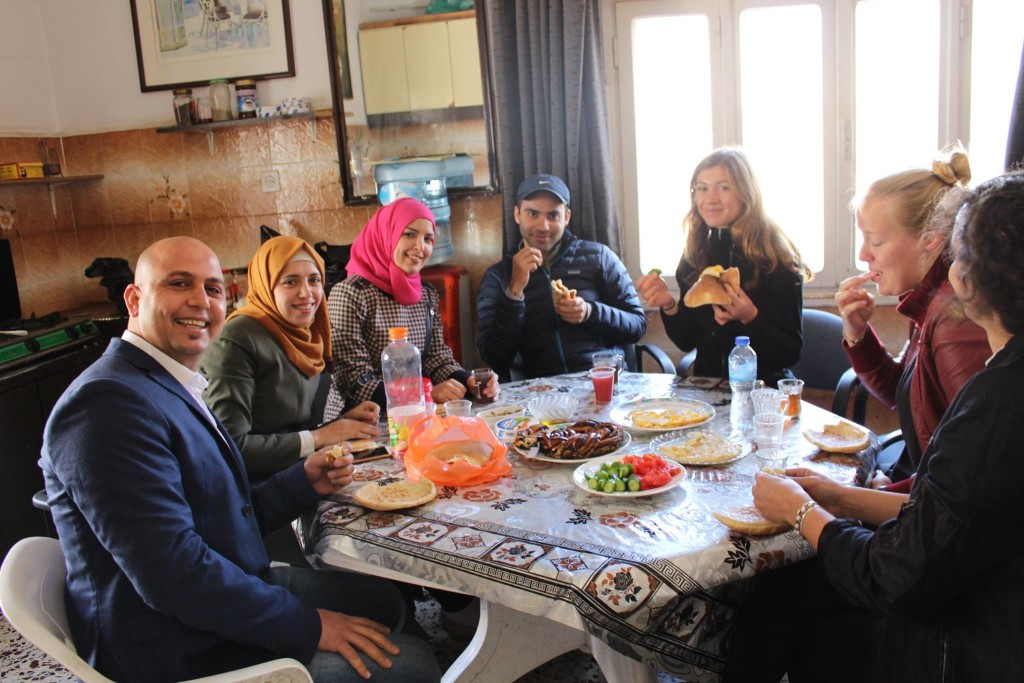 “‘Hun! Hun! Hun!”. I open bleary eyes to greet the ‘chime’ of seven o’clock, in the form of a few hard ‘BANGS’ on my bedroom door, from the clenched fist of my four year old host brother.
“‘Hun! Hun! Hun!”. I open bleary eyes to greet the ‘chime’ of seven o’clock, in the form of a few hard ‘BANGS’ on my bedroom door, from the clenched fist of my four year old host brother.
After my luggage, and consequently my alarm clock, was retained by airport security for examination, in Tel Aviv, my host mother Sanaa, offered to ask the kids (four and eight) to deliver my wake up call for work. My four year old host brother’s tactics were perhaps less cute than I’d expected.
I’d spent the previous evening with a friend, Tim who was visiting me for a couple of weeks, and had got back a bit later than I maybe should have. Not the least haram behaviour to be spending time with a male friend after dark, but apparently ‘you’re a Westerner, mish mushkila’, so I went, slightly awkwardly, after work, to see his hostel.
The people staying with Tim at the hostel were mostly in Hebron to learn Arabic, or to intern with the HRC (Hebron Rehabilitation Committee). An eighteen year old who wanted to be a journalist was learning Arabic and blogging about Hebron, a Spanish girl had studied Arabic at university and wanted learn dialect before taking a masters in Middle East politics.
I stayed quite late talking and listening to music on their balcony which gave a brilliant view of Hebron. After five days, I felt comfortable enough walking about in the dark in H1 so getting back wasn’t an issue, even if getting up in the morning might be.
‘Good morning’, I hear my eight year old host brother, Youssef say from the other side of the door. I clasp the handle, mentally preparing to be wrestled back into bed again.
After a bit of squealing, their father gets the idea, and starts, from his own bed, to yell in dialect to ‘get out of Alice’s’ room’. I’d adopted my middle name after realising that (despite the fact Israeli security seemed to think my name was Arabic) Arabs mostly can’t pronounce it.
The desired effect of the yelling achieved, I was able to sling on a borrowed shirt, wriggle into the trousers I’d been wearing for five days and jog to the Centre.
Eased into the day with my first cup of tea of the half a dozen or so made throughout the day, I started revising dialect for my class that afternoon.
I’d been learning MSA (Modern Standard Arabic, or Fusha) in Morocco for a few months before coming to Hebron, but my knowledge of dialect had been zilch when I arrived here. Thankfully, it’s not too challenging once you have a bit of MSA, and whereas I’d used a lot of French in Morocco, there’s a practical need with dialect here.
Rafat, the Centre manager, called me into the kitchen to say hi and sort out the articles I was going to write for the day. As well as the usual couple of pieces of writing on Hebron and the Centre, Rafat asked if I’d help out with English listening exams.
The days are invariably busy, but somehow feel incredibly relaxed. Probably, it was the steady flow of food and tea.
Breakfast is at ten: probably the only occasion that doesn’t happen ‘Arabic time’ (half an hour late). Staff, volunteers, and interns sit at a round table in the kitchen or on the roof in the sun. As usual, the spread involves flat bread, falafal, beans, eggs, and cake. Conversation touches on pretty much everything, from culture to politics, jokes and gossip. We talk about Bika’s work in Global Health, problems at the hospital in Ramallah, mine and Rafat’s experiences working with refugees, and whether or not Ibrahim was Ellen’s ‘habib’…
After a morning spent researching and writing articles, I have dialect class. My teacher is around my age and we get on well. Since Google maps reads Hebron as no more than a grid of anonymous streets, I was very happy to accept her offer to show me around the weekend before.
After class, I helped conduct listening tests with groups of five students, who we asked questions as diverse as ‘if you had a brain washing machine, who would you use it on, and why?’, and ‘in your opinion, what is freedom?’. They were all very anxious about the exams, and it felt good to be part of something that was so important to them.
When we were then called to briefing for the Centre’s Fifth Anniversary celebrations occurring that evening, Rafat, whose time in Germany seems to have compounded his natural efficiency, already had his board pens out, and was sorting the room into groups. He outlined the timetable for the evening – neatly obscuring fifteen minutes in which gifts were to be given to members of staff.
Within an hour, everyone was dressed for dinner, the men suited up, and many of the women in the red and black beaded dresses traditional to Palestine. I joined them in my tracksuit, which the locals tend to wear as ‘pyjamas’, and so felt faintly ridiculous as a member of the Welcome committee. At least I could say hi in dialect, but I definitely missed my luggage.
After a long evening of games, prizes, music and rice and (freshly killed, I am told….) sheep, with endless plastic cups of soda, I was pleasantly tired, and walked back to my host family’s house with Chesterton’s essays on Dickens (which I’d won as a prize) clasped under my arm.” Alice from the UK who volunteer to write articles about Palestine


